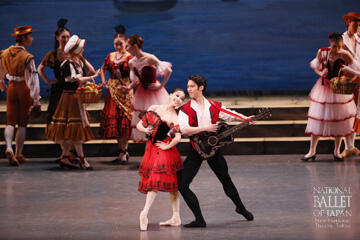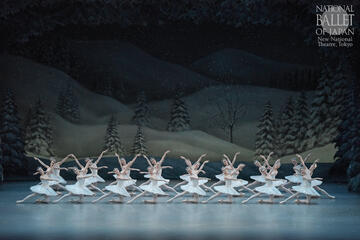Interview: YOSHIDA Miyako - I hope to bring ballet to as many people as possible
―Your first season as Artistic Director of the National Ballet of Japan is about to begin.
Yoshida: I am coming up with lots of ideas, and my dreams are just getting bigger and bigger. I'm still not sure how far I can go to achieve what I am thinking about, but I hope I can pass on this precious ballet company to the next Artistic Director in better form.
In light of the COVID-19 pandemic, we need to explore new ways to bring ballet to people such as live-streaming, as well as performing in front of live audiences. Having said that, I strongly believe that a performance is only truly complete when a live audience is in the theatre watching the performers. With this in mind, we will do whatever we have to in order to get as many people back into the theatre as we can.
―Theatres around the world have been facing an unprecedented crisis because of COVID-19. The New National Theatre, Tokyo also had to cancel several performances as well. How else has it affected the company?
Yoshida: I am really grateful that the dancers kept up with their training during the COVID-19 restrictions and came back to the studio still in shape and ready to rehearse.
Many companies and dancers around the world have been very active online, and we too launched a digital programme of our own called "NNTT at Home". Also, on Instagram, our Principal dancer Yudai Fukuoka organised a series of interviews with his dancer colleagues, and I hope viewers found it interesting to see some of our dancers' off-stage personalities.
Sir Peter Wright's version of Swan Lake (new production) was supposed to open our new season, but it has been replaced with Don Quixote instead. This was because the UK went into lockdown. Although it was unexpected, I am very happy to take over Don Quixote which was originally part of the previous season led by the former Artistic Director Noriko Ohara. I really look forward to the casting chosen by her, which will give many unsung dancers a chance to shine. We still hope that there will be another opportunity to show Sir Peter Wright's version of Swan Lake in due course.
―Please tell us what you would like to focus on once you become Artistic Director.
Yoshida: I hope to bring ballet to as many people as possible and give them an opportunity to know more about this art form. I would like ballet beginners to come to the theatre, and I would also like to suggest that watching a ballet performance can be part of an entertaining night out for adults. It seems for many Japanese people ballet is strongly associated with children's recitals, so I would like to create more opportunities to enjoy professional dancers' performances for those who have not had the chance to do so before. Considering the current situation with COVID-19, it would be extremely difficult to organise these sorts of events, but we would like to continuously make an effort to achieve this goal.
Currently, we only invite members of "CLUB The Atre" and our Supporters to our dress rehearsals, but I hope to make rehearsals more accessible to the public in the future because I believe audiences will find it interesting to see the process that goes into putting a professional ballet on the stage.
The Royal Ballet in the UK offers a number of programmes specifically for children such as dance workshops and family-friendly performances. We would like to learn what goes into organising these kinds of activities, and explore new possibilities to nurture a new kind of audience at the NNTT. I also believe that charitable and social contribution activities are something we must do as a national theatre.
―What kind of repertoire do you think will be necessary for the National Ballet of Japan in the future?
Yoshida: I would like to include works that will be a real challenge for our dancers, but at the same time I need to make sure that they are not too far from what the audience would like to see and enjoy. It is really difficult to strike the right balance with audience needs, but this is the same for every ballet company around the world. Even in the UK, there was a time when it was difficult to attract an audience to see a triple bill, but now tickets are almost sold out every time one is performed. It always feels like everyone in the audience is really excited about seeing a fresh, diverse programme in one performance. It is my hope that the NNTT will be able to offer that same sort of excitement in its performances going forward, which will make people think that something is happening here.
I would like to emphasise that creating original works is also very important. Although there are risks involved, to create works that will remain in our already rich repertoire will always require a certain amount of time and financial investment to do it right.
―The lineup for the 2020/2021 season includes a wide range of works, not just British works.
Yoshida: I wanted to be fair and did not want to only include British works because of my past experience and connection to them. Of course, there are so many amazing British ballets, and I think there is something that only I can pass on to dancers through those works, so I will be including British ballets in the future season. It is also very important for dancers to work with a variety of choreographers, which will be very stimulating for them.
As for the lineup of contemporary dance, I have chosen programmes from a variety of possibilities with a scope that is only possible to realise at the NNTT. Although I couldn't include it in this season, "DANCE to the Future" (a showcase of new choreography created by the NBJ dancers) is a great opportunity to nurture young choreographers. I love this event because it is always really exciting, and I can feel the energy from our dancers when they perform in it. I hope that the work we create as part of this event will be performed at the Opera Palace (Opera House) someday.
―What do you think needs to be improved in terms of dancers?
Yoshida: I would like them to be able to express emotions in their own way. This is something the former Artistic Director OHARA Noriko focused on, but I would also like to continue to do so, in order to improve our dancers' expressiveness. For instance, if you compare a role like Basil from Don Quixote with a noble role such as a prince, the way you walk or the way you stretch out your hand will be completely different. You need to understand their character first in order to correctly convey their emotions. Acting should be natural, but you cannot just stay completely natural, it's all about the context of the role. I would like to be very particular about such details.
Strengthening dancers' technique is important too. Daily lessons are the only way to achieve that. I would especially like to focus on the use and articulation of their feet and turn-out, which is the most basic of basics. I will be persistent about these things when I coach them.
―It sounds like you may spend more time in the studio to directly coach them.
Yoshida: I cannot help making corrections when I watch dancers (laughs). Dancers already know what they want to do in their minds, but to achieve it with their bodies requires a constant reminder of what needs to be done by someone else. I know this because this was what I needed when I was dancing. That's why I do not want to give up on any dancer, and I would like to be persistent when I coach. To be able to do so, I will try not to forget what I needed and appreciated the most when I was dancing, as well as not forgetting both the mental and physical pain I experienced as a dancer.
―It's been one year since your retirement. How do you think you've changed?
Yoshida: My priorities have changed completely. When I was dancing, I just focused on my body and next performance, but now all my energy is dedicated to my work as Artistic Director. Everything is new for me, but I am grateful for the people who have supported me.
Before taking this job as Artistic Director, I had never thought about actively communicating with the public but now I would like people to know our company, and I want to connect with as many people as possible to spread the word. It's not something I am naturally good at, but I believe it is my duty to do my best for all Japanese children studying ballet and for the future of ballet.
―Are you still taking classes?
Yoshida: Actually, I resumed taking classes during the quarantine period. After my retirement, I did not have the time to take any classes at all. I felt I needed to strengthen my body first before joining ballet classes again. Due to the pandemic, I had to stay home and started taking online classes and have been doing so ever since. I have never used YouTube so much! I now feel that my body is getting stronger again, so I would like to maintain that.
Speaking of maintenance, there is an urgent need to improve the environment and facilities of the ballet company. I am so happy that now we have training machines. Since our dancers and repertoire are about to reach world-class standards, I would like to ensure that the working environment and the finances of the company match that same level.
―Is there anything you would like to say to your audiences?
Yoshida: Although nobody knows what will happen tomorrow, dancers are very motivated by the people who come to theatre in this difficult time. I will dedicate myself to create performances that will make the audience think, "I'm glad I came" and "I would like to come again". I think now many people are under considerable stress without realising it, so I hope that experiencing art can give them some sort of relief, letting them feel things are getting back to normal again.


